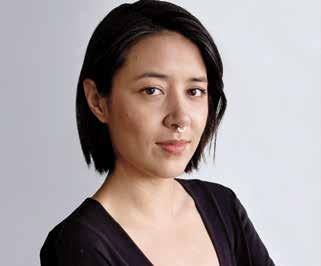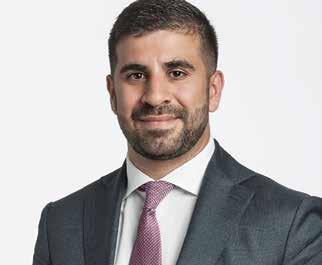
3 minute read
Three alumni breaking ground in the tech world
by Julia Dyck
A McGill Law degree is a valuable asset for a wide range of career paths. Focus Law/Droit spoke with three alumni who are using their legal education to embark on innovative professional endeavours.
Advertisement
After five years, of working in management consulting for McKinsey & Company, Eytan Bensoussan, BCL/ LLB’10, MBA’10, realized it was time to begin his own business journey. He cofounded NorthOne, www.NorthOne.com, a financial technology company offering a fast deposit account built for small businesses, start-ups and freelancers across America.

Eytan Bensoussan.
Bensoussan wrote the bar exam but never practised law, although his legal education and experience in the field helped him build his innovative career. “My time at McKinsey exposed me to these massive shifts in technology that were changing the way that banking was being developed and consumed around the world.”
He always thought that a legal education would be an advantage in the business world. The rigorous thinking and ability to assess large amounts of information that are fundamental to a legal education has been extremely valuable to his endeavours in the tech sector. During his time at Chancellor Day Hall, he took the time to get to know his professors, including Rod Macdonald, Tina Piper and Helena Lamed, and says their ongoing support has encouraged him to continue forging his path outside the practice of law.
Yuan Stevens, BCL/LLB’18, works as Policy Lead on Technology, Cybersecurity & Democracy at the Ryerson Leadership Lab, a fitting outlet for the unique and specialized knowledge she honed during her time at McGill Law.
With music and education degrees in hand, Stevens chose to study law in order to expand her career potential, although she wasn’t planning on becoming a lawyer. Stevens knew she was interested in the intersection between technology and law, and sensed a need for more expertise in this domain.

Yuan Stevens.
Stevens recognizes the importance of her transsystemic education when working on issues that are not constrained by jurisdiction, such as the internet. Among her recent accomplishments, she notes her work on facial recognition technology and its use by the RCMP, relying on her analytical and boundary-crossing skills to shed light on the ways tech companies and law enforcement are taking advantage of weak legal regimes in Canada.
“Canada needs more people with legal and tech knowhow, especially from the communities who stand to be the most affected by the harms resulting from the use of technology, including people of colour, queer people, disabled people, etc.” Stevens said. “There’s a need for people with that expertise and I hope that McGill Law is a place that develops those leaders.”
Less than one year ago, mid pandemic, Saam Mashhad, BCL/LLB’17, left his job in commercial litigation at Norton Rose Fulbright to cofound EvenUp. The start-up is building technology that determines the potential value of personal injury lawsuits. EvenUp uses this information to provide low-cost litigation financing for plaintiffs and deploys it in software that helps lawyers build automated demand packages for personal injury claims.

Saam Mashhad.
Various writing projects and entrepreneurship classes at McGill supported the development of Mashhad’s bold ideas, and gave him the technical knowledge that has been crucial in the fast-paced environments of both law and business. His education also allowed him to “think in a structured way about inherently uncertain problems with uncertain solutions, and develop some comfort around this uncertainty.”
Mashhad is grateful for and proud of his engagements on different files during his time working a firm. While he notes that taking the leap towards entrepreneurship was not easy, he is thrilled to be building his own successful business, securing venture capital and hiring his own team. He’s excited about the future of legal technology, seeing significant opportunities for tech in the hands of lawyers and its potential to have a direct and positive impact on the general public and in people’s everyday lives.










